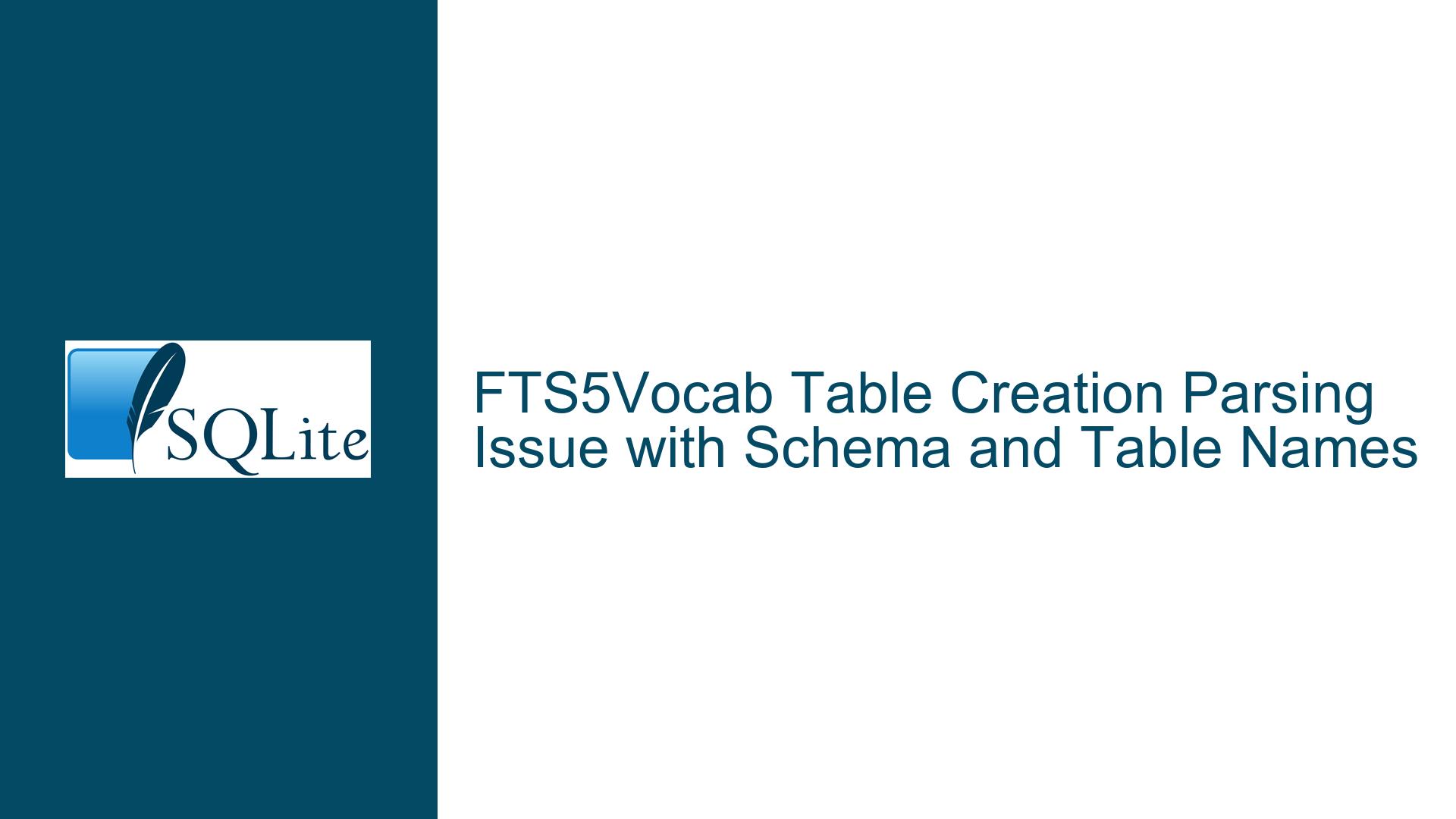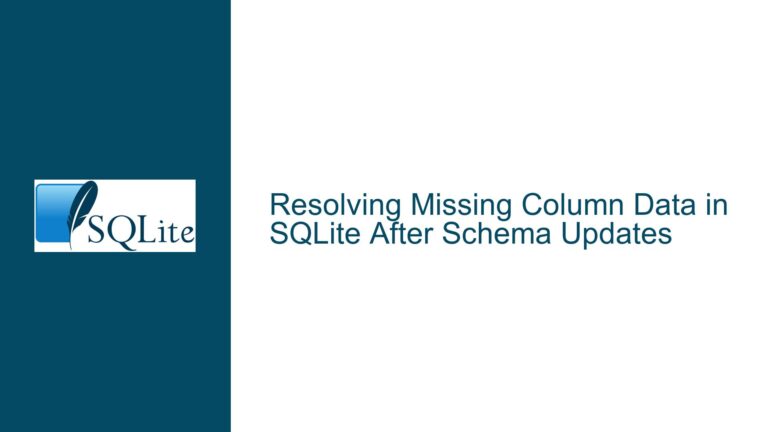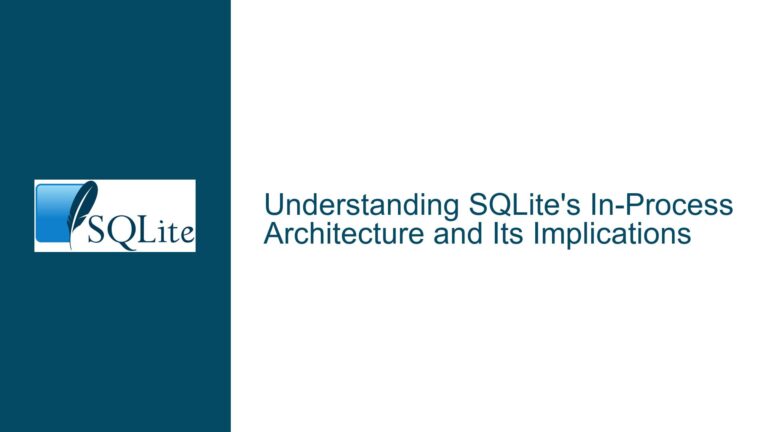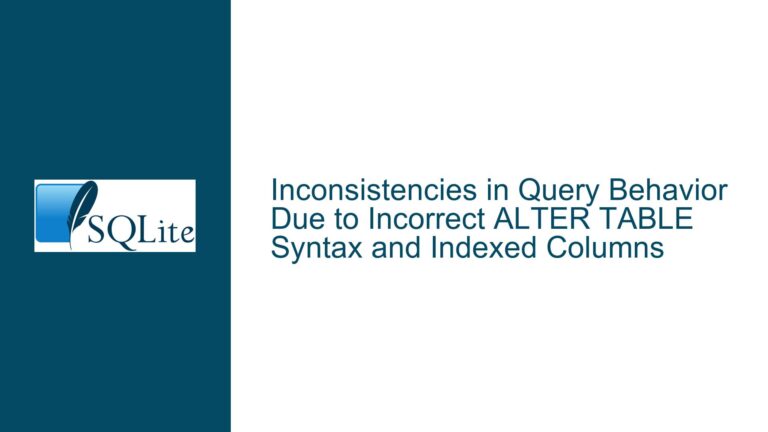FTS5Vocab Table Creation Parsing Issue with Schema and Table Names
Issue Overview: FTS5Vocab Table Creation Fails with Combined Schema.Table Identifiers
When creating a virtual table using the fts5vocab module in SQLite, the parser encounters issues when the schema and table names are combined into a single identifier using square brackets [] or backticks `. For example, [temp.foo3] or `temp.foo3` results in a parsing error, specifically a "wrong number of vtable arguments" error. This issue arises because the parser interprets [temp.foo3] as a single identifier rather than separating it into the schema (temp) and table name (foo3). This behavior is inconsistent with the expected parsing of schema and table names in SQLite, where the schema and table name should be treated as distinct entities.
The problem is particularly relevant when developing tools or wrappers around SQLite, such as a Python wrapper for FTS5, where schema and table names might be dynamically generated or passed as arguments. Ensuring that schema and table names are handled correctly is critical for robust application development. The issue is not limited to square brackets; backticks exhibit the same behavior, further complicating the matter for developers who rely on these delimiters for handling special characters or reserved keywords in table names.
The error message "wrong number of vtable arguments" indicates that the fts5vocab module is receiving an incorrect number of arguments due to the misinterpretation of the combined schema and table name identifier. This behavior is unexpected because SQLite typically allows schema and table names to be combined in other contexts, such as in standard CREATE TABLE statements. The inconsistency highlights a parsing quirk specific to the fts5vocab module, which requires developers to adopt specific workarounds to avoid runtime errors.
Possible Causes: Misinterpretation of Combined Schema.Table Identifiers in FTS5Vocab
The root cause of the issue lies in how the fts5vocab module’s parser handles combined schema and table names. When a combined identifier like [temp.foo3] or `temp.foo3` is provided, the parser treats it as a single entity rather than splitting it into separate schema and table name components. This behavior is inconsistent with SQLite’s standard parsing rules, where such identifiers are typically split into their constituent parts.
The fts5vocab module expects three arguments: the schema name, the FTS5 table name, and the vocabulary type (e.g., ‘row’). When a combined identifier is provided, the parser incorrectly interprets it as a single argument, leading to the "wrong number of vtable arguments" error. This issue is exacerbated by the fact that SQLite allows combined identifiers in other contexts, creating an expectation that the same syntax will work with fts5vocab.
Another contributing factor is the use of delimiters like square brackets and backticks. While these delimiters are commonly used to handle special characters or reserved keywords in identifiers, their use in this context confuses the fts5vocab parser. The parser does not recognize the delimiter as a separator between schema and table names, leading to the misinterpretation of the combined identifier.
The issue is further complicated by the fact that the fts5vocab module is a virtual table module, which has different parsing requirements compared to standard SQLite tables. Virtual tables in SQLite often require specific argument formats, and the fts5vocab module is no exception. The module’s parser is designed to handle distinct schema and table name arguments, and it does not account for the possibility of combined identifiers.
Troubleshooting Steps, Solutions & Fixes: Properly Separating Schema and Table Names in FTS5Vocab
To resolve the issue, developers must ensure that schema and table names are provided as separate identifiers when creating an fts5vocab virtual table. This can be achieved by explicitly separating the schema and table name using the appropriate delimiter. For example, instead of using [temp.foo3], developers should use [temp].[foo3] or `temp`.`foo3`. This ensures that the parser correctly interprets the schema and table name as distinct arguments.
When dynamically generating schema and table names in a programming language like Python, developers should construct the CREATE VIRTUAL TABLE statement by explicitly separating the schema and table name components. For example, if the schema is stored in a variable schema_name and the table name is stored in a variable table_name, the statement should be constructed as follows:
query = f'CREATE VIRTUAL TABLE [{schema_name}].[{table_name}] USING fts5vocab("main", "enron", "row");'
This approach ensures that the schema and table name are treated as separate identifiers, avoiding the parsing issue.
For cases where the schema or table name contains special characters or reserved keywords, developers should continue to use delimiters like square brackets or backticks. However, they must ensure that the delimiters are applied to each component separately. For example, if the schema name is my-schema and the table name is my-table, the statement should be written as:
CREATE VIRTUAL TABLE [my-schema].[my-table] USING fts5vocab('main', 'enron', 'row');
This ensures that the parser correctly interprets the schema and table name as distinct arguments.
Developers should also be aware of the limitations of the fts5vocab module when working with combined identifiers. While SQLite allows combined identifiers in other contexts, the fts5vocab module requires explicit separation of schema and table names. This limitation should be documented in any tools or wrappers that interact with the module to avoid confusion and runtime errors.
In summary, the issue can be resolved by ensuring that schema and table names are provided as separate identifiers when creating an fts5vocab virtual table. Developers should avoid using combined identifiers like [temp.foo3] or `temp.foo3` and instead use [temp].[foo3] or `temp`.`foo3`. By following this approach, developers can avoid the "wrong number of vtable arguments" error and ensure that their fts5vocab virtual tables are created correctly.






